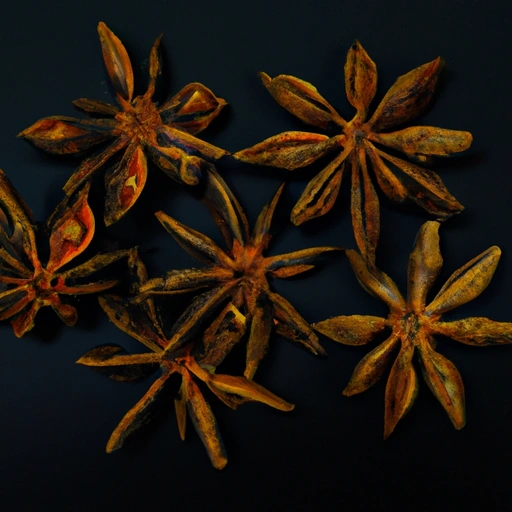Star Anise
Description

Star anise, known for its distinctive star shape and aniseed flavor, is a spice made from the fruit of the Illicium verum plant. It is widely appreciated not just for its strong licorice-like taste and aroma but also for its contribution to sweet and savory dishes worldwide.
Common uses
Star anise is commonly used in cooking and baking, as well as in the production of liquors and pharmaceuticals.
Nutritional value
Calories
A common serving of star anise (2 grams or about 1 teaspoon) contains approximately 7 calories.
Protein
Star anise has a modest protein content, with about 0.37 grams per serving.
Fat
This spice contains a negligible amount of fat, with less than 0.1 grams per serving.
Carbohydrates
Star anise contains roughly 1 gram of carbohydrates per serving.
Vitamins
While not a significant source of vitamins, star anise does contain trace amounts of vitamin A and C.
Minerals
Star anise is rich in minerals such as calcium, potassium, and iron, enhancing its value in a balanced diet.
Health benefits
Star anise is reputed for its digestive properties and is often used to alleviate cramps and nausea. Its active compound, anethole, is known for its antimicrobial and anti-inflammatory effects.
Potential risks
When consumed in culinary amounts, star anise is generally safe. However, caution should be exercised as it may interact with certain medications, and the Japanese star anise variety can be toxic if ingested.
Common recipes
Star anise is a key ingredient in the Chinese five-spice powder and is essential in Vietnamese pho. It's also used in Indian masala chai and various European baked goods.
Cooking methods
This spice can be used whole or ground, to infuse dishes with flavor through simmering, baking, or roasting.
Pairing with other ingredients
Its licorice flavor pairs well with cinnamon, cloves, and nutmeg, as well as with meats like duck and pork.
Summary
Star anise is a versatile and flavorful spice with a rich history and numerous health benefits. Its unique taste and aromatic profile make it an essential ingredient in various cuisines and its nutritional content adds another layer of value to its culinary uses.